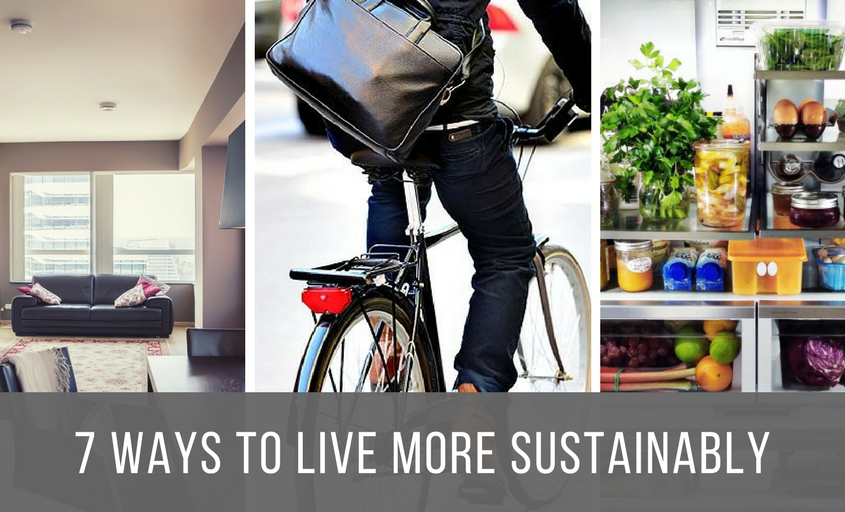Occasionally it may seem like healthy and sustainable living is set in exactly the same basket as high-priced living. But this isn’t accurate.
There are little ways I’ve found to be more sustainable without paying a large amount of money.
Here are a few tips that go a long way when it comes to healthy living and the environment. Give them a go and let me know how they work for you. Also, share any tips you have for sustainable living so we can all learn together.
Ditch Bottled Water

(Photo Credit: https://www.amazon.com/Sfee-Double-Vacuum-Insulated-Stainless/dp/B01M5ICJLT/ref=sr_1_3?s=sporting-goods&ie=UTF8&qid=1493153685&sr=1-3&keywords=metal water bottles)
Bottled water uses lots of fossil fuels (more pollution) between their creation and transportation. That’s lots of energy for something you simply discard in the trash. AND they’re not that good for you either (enough of the plastic already). Get a good glass or metal water bottle you could fill up time and time again.
Something similar to this metal water bottle on amazon will do the trick (and it tastes better and keeps it cooler).
Are you aware that tap water has more strict security regulations than bottled water in America? If you’re still uneasy, then make an investment in a water filter. You’ll conserve energy, money, yourself, and also the earth.
Reusable Grocery Bags
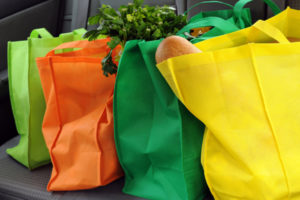
(Photo Credit: http://stmedia.startribune.com/images/reusable-grocery-bags.jpg)
This could be any reusable bag…but my natural grocery store had some reusable bags produced from recycled stuff for $5 per bag, and I use them alllllll the time.
It’s easy to forget them before you go shopping though. So keep them somewhere you’ll remember or make a note of it on your grocery list.
Using all these grocery bags will help cut down on every one of the plastic bags which are thrown away. Plastic bags are horrible! It takes up to 1,000 years for plastic to decompose. And they’re harmful for wildlife. They get in dolphins stomachs, snag in turtles mouths, endanger birds…the list goes on and on.
Also, plastic bags eat up lots of fossil fuels (such as petroleum) in its development. Up to 100 million barrels of petroleum are needed to create the plastic bags used world-wide every year.
I can’t say it enough. Cut back on plastic.
Cut Down On Paper
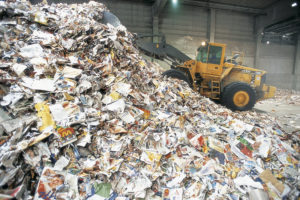
(Photo Credit: http://zfrescuerangers.blogspot.com/2015/09/dont-waste-paper-by-adam-hubert.html)
It’s great to recycle paper. Definitely do that. But it’s even better to cut back all together.
How?
Rather than writing things down on paper, I use my cell or iPad for notes, lists, and memos.
Rather than getting receipts, I use e ticket or e-receipt choices (example: for concerts, films, flights, games, etc.)
Rather than utilizing paper towels, make use of the air-driers instead.
All these small things actually add up.
Cut Back On Air Pollution

(Photo Credit: http://www.huffingtonpost.com/2013/05/16/bike-to-work-day-2013_n_3280640.html)
Take a walk.
It’s more difficult in the US to walk around places because we tend to be spaced out further from stores and neighbors than in other countries. Particularly in rural areas. But if you can walk somewhere, do. Make it into a family outing, get some exercise, or bond with your spouse. A lot can be done in a walk.
Take advantage of your public transportation.
A lot of public transportation uses clean energy to get people around. Some are free or don’t cost much to ride. Most of the time I know many of us don’t want to build our schedules around public transportation, but it helps cut back on pollution so much! Once you build the habit, it’s easy.
Bike!
Bikes, yay. I really like them…though I do wish the US had better roads for bikers. But biking is a great way to get some fresh air and your heart pumping.
Carpooling is an effective way to reduce pollution. Get a ride or offer rides to cut back on pollution.
Going Green In Your Home

(Photo Credit: http://www.abetterearth.org/category/green-energy/ )
Going green isn’t all that costly. There are lots of ways in which you can go green in your home that are affordable.
There are really so many advantages to being energy efficient. You save a lot of money on energy bills, you keep your home clean, and you also feel better about your effect on the planet.
Some easy, affordable ways to go green are:
- You can change your lightbulbs out for energy LED lightbulbs that are efficient. They cost somewhat more upfront, but they last longer and save you plenty of money.
- Use a programmable thermostat to keep heat or cooling down when you don’t want it. Or when you are away.
- Keep lights off and use natural lighting (sun) when you can.
- Reduce water use—take shorter showers, run sprinklers at optimum times, switch out water-hungry grass for garden space, etc.
- Recycle—recycling bins may be useful in regards to sorting your trash.
- Birds love dryer lint for constructing their nests.
- Garden—cut back on mass production foods.
- Use home automation (including smart lights) to reduce electricity bills and energy usage.
- Explore national and state tax incentives that will help you cut prices in going green.
Many states give qualifying homeowners free solar panels though you might consider this more of an investment. By free I mean they’re using rebates and federal tax incentives to hook people up with solar panels and then the homeowners essentially purchase the electricity from that solar business. So even solar energy is more affordable than you’ve been led to believe.
Grow A Garden
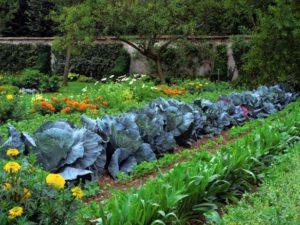
(Photo Credit: http://www.abetterearth.org/category/green-energy/)
Nothing beats eating your own fresh food from your garden. You know where it’s been, what’s been put on it, where it’s been stored…
Just instant peace of mind.
Transporting mass production food emits lots of fossil fuels. They’re generally grown with a lot of pesticides that then leak into our water. It’s just not great. It’s crap for our environment and our bodies.
Don’t have space for a garden? That leads me to me next tip….
Make Friends With A Farmer
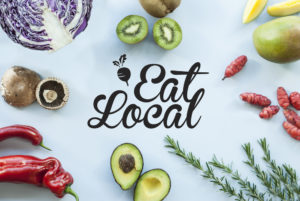
(Photo Credit: http://www.carolinekonarkowska.com/eatlocalcampaign/)
Find a farmer and make friends. Buy produce from those who garden and harvest animals locally. Go to your farmers market. There are so many ways to support your local economy and your local farmers.
The food you get there will be healthier than store-bought, mass-produced food. And it tastes a LOT better.
You’re also helping to cut down on the pollution chain that goes into the mass production of foods (such as gigantic cow/chicken farms).
Hope this helps you all! I know it’s made my life better.
